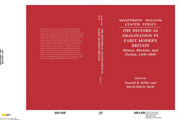Book contents
- Frontmatter
- Contents
- Preface
- WOODROW WILSON CENTER SERIES
- 1 Introduction
- 2 Precept, example, and truth: Degory Wheare and the ars historica
- 3 Truth, lies, and fiction in sixteenth-century Protestant historiography
- 4 Thomas More and the English Renaissance: History and fiction in Utopia
- 5 Little Crosby and the horizons of early modern historical culture
- 6 Murder in Faversham: Holinshed's impertinent history
- 7 Foul, his wife, the mayor, and Foul's mare: The power of anecdote in Tudor historiography
- 8 Experience, truth, and natural history in early English gardening books
- 9 Thomas Hobbes's Machiavellian moments
- 10 The background of Hobbes's Behemoth
- 11 Leviathan, mythic history, and national historiography
- 12 Protesting fiction, constructing history
- 13 Adam Smith and the history of private life: Social and sentimental narratives in eighteenth-century historiography
- 14 Contemplative heroes and Gibbon's historical imagination
- Contributors
- Index
- Titles in the series
2 - Precept, example, and truth: Degory Wheare and the ars historica
Published online by Cambridge University Press: 04 August 2010
- Frontmatter
- Contents
- Preface
- WOODROW WILSON CENTER SERIES
- 1 Introduction
- 2 Precept, example, and truth: Degory Wheare and the ars historica
- 3 Truth, lies, and fiction in sixteenth-century Protestant historiography
- 4 Thomas More and the English Renaissance: History and fiction in Utopia
- 5 Little Crosby and the horizons of early modern historical culture
- 6 Murder in Faversham: Holinshed's impertinent history
- 7 Foul, his wife, the mayor, and Foul's mare: The power of anecdote in Tudor historiography
- 8 Experience, truth, and natural history in early English gardening books
- 9 Thomas Hobbes's Machiavellian moments
- 10 The background of Hobbes's Behemoth
- 11 Leviathan, mythic history, and national historiography
- 12 Protesting fiction, constructing history
- 13 Adam Smith and the history of private life: Social and sentimental narratives in eighteenth-century historiography
- 14 Contemplative heroes and Gibbon's historical imagination
- Contributors
- Index
- Titles in the series
Summary
If they mention him at all, modern historians have not thought much of Degory Wheare, the first Camden Professor of History at Oxford. He assumed his post in 1623, the year in which William Camden died, and for the next twenty-four years lectured on Roman history from the text his patron had prescribed, the Epitome of Lucius Annaeus Florus. “The first incumbent,” writes Joseph Levine, “took eight years to cover the first book [of Florus], drawing comparisons between ancient and modern events as he plodded along.” D. R. Woolf describes him as “a competent classicist and dull pedagogue … [who] continued to drone on through the civil war till his death in 1647, providing the history of academic tenure with an inauspicious beginning.” Even the work that earned Wheare a measure of fame, The Method and Order of Reading Histories, has been treated in patronizing fashion as “not entirely without merit as a compilation” and “repeating the commonplaces of the familiar Renaissance ars historica. But The Method and Order was neither so dull nor so neglected in its time as its modern critics suggest. Between 1623 and 1710 at least six Latin and four English editions were published in England and two Latin ones in Germany, together with several variants and extensions in both countries. It was the only widely known English example of the Renaissance ars historica, and the last of its type in Europe. As such, it improved upon most of its precursors and showed awareness of the tensions within the genre.
- Type
- Chapter
- Information
- The Historical Imagination in Early Modern BritainHistory, Rhetoric, and Fiction, 1500–1800, pp. 11 - 36Publisher: Cambridge University PressPrint publication year: 1997
- 5
- Cited by

